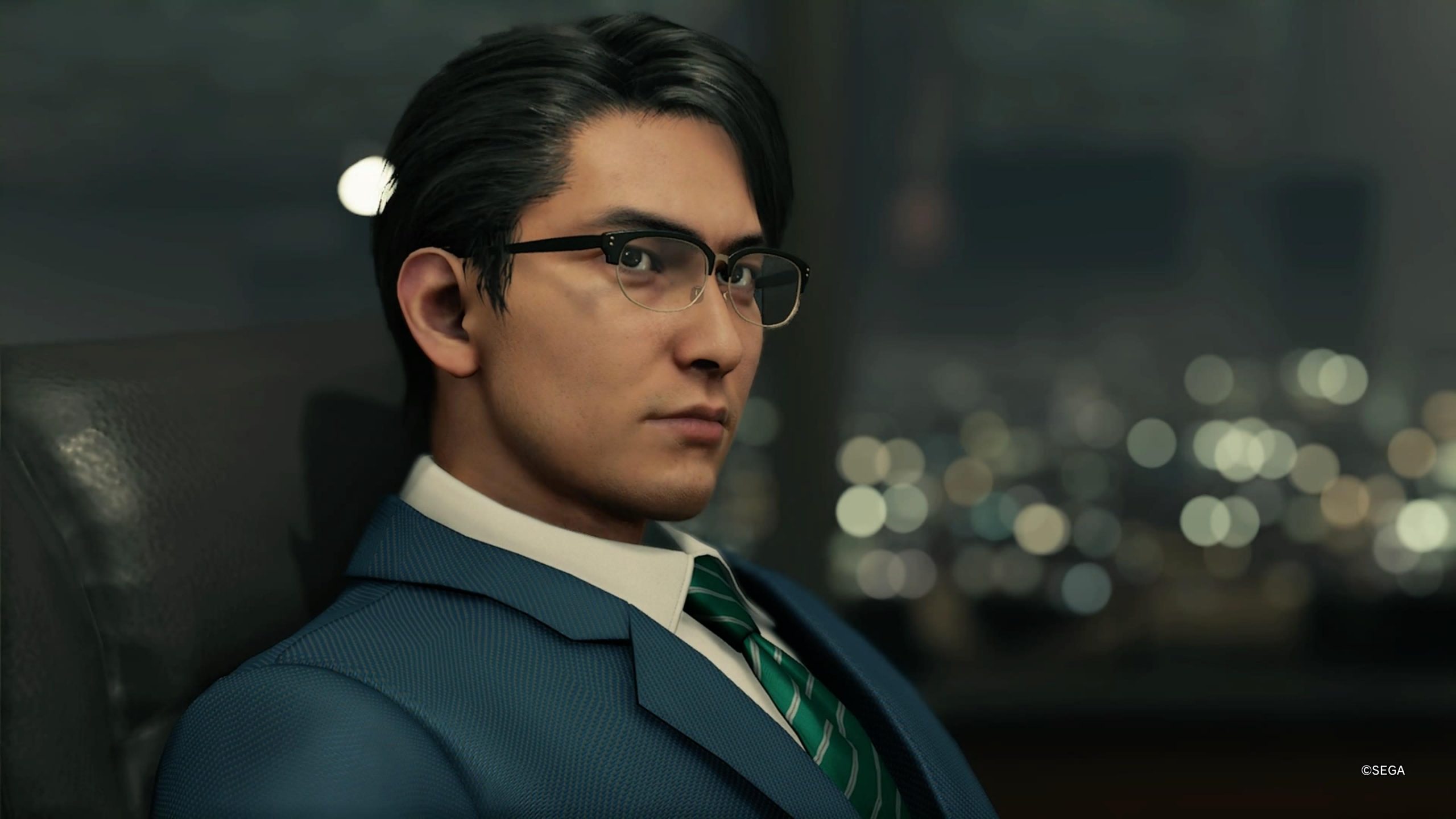Yakuza: Like a Dragon deals with a multitude of real-world issues, all of which are particularly relevant to Japan but also easily understood by Western audiences. Homelessness, sex work, the tightrope illegal immigrants walk to survive without being deported — you’d almost be forgiven for forgetting that you’re playing a work of fiction. But there’s one element of this game that mirrors reality more than any other, and considering the timing of LAD’s release, it’s downright eerie how strong the similarity is. I’m talking, of course, about the main villain of the game: Ryo Aoki.
Before I move on, let me get a quick disclaimer out of the way. In order to discuss Aoki, I necessarily have to reveal certain facts and events that are spoilers for the latter half of the game. Rest assured, I won’t air all of Aoki’s dirty laundry and I will be as vague as possible, so there’s plenty more to learn about him if you haven’t played LAD. However, if you are spoiler conscious, please consider bookmarking this feature and coming back once you’ve beaten the game. I’ll be waiting with a box of tissues.
All good? Alright, let’s continue.
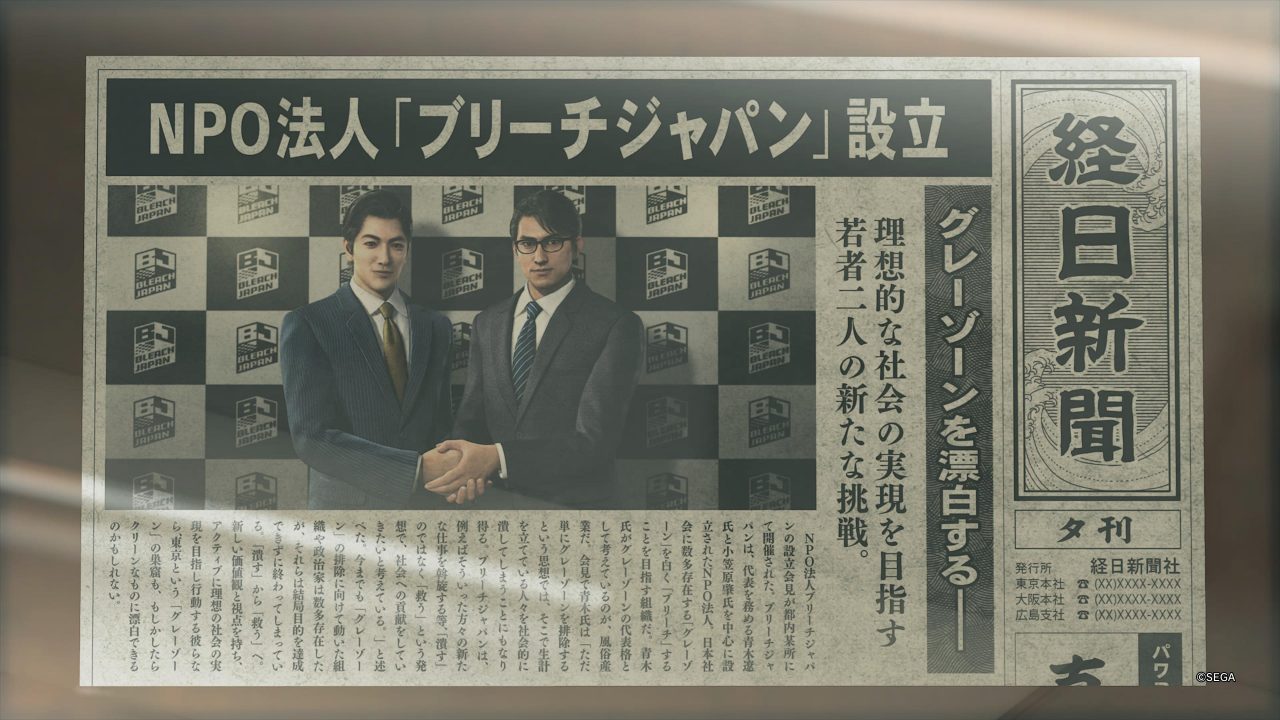
Aoki is a political figure with a hidden past and a lot of shady connections. After studying abroad in the United States, he returns to the land of his birth and founds Bleach Japan, a political activist group dedicated to wiping out the “gray zones” in Japanese society, namely those involving sex work and other activities of questionable legality. Riding on the success of this venture and his knack for charming people, Aoki is elected to the House of Councillors, the upper house of Japan’s bicameral legislature. Several years later, he becomes governor of Tokyo in a landslide election made possible in large part thanks to his hidden ties to a yakuza family. This position affords Aoki immense political power. Combined with his criminal connections, he wields that power to — surprise, surprise — gain even more power.
Aoki’s ultimate goal is to essentially control Japan by controlling their elections. Using Bleach Japan and the Kansai-based yakuza group known as the Omi Alliance, he blackmails his way into becoming the ruling party chair. Once in that position, he manipulates the prime minister into holding a snap election — where the House of Representatives is unilaterally dissolved and re-elected — by promising him enough seats to ensure his continued tenure. Snap elections are effectively the norm in real-life Japanese politics, and the House of Representatives has the most sway over who is appointed prime minister. But Aoki isn’t really concerned so much with keeping the prime minister in power as he is with demonstrating to everyone in the country (and abroad) how much influence he has over the electoral process. Basically, he wants to show that he can guarantee the election of any individual, no matter how inept or unsuited they might be for the job. Doing so would make his involvement practically a requirement for any current or future politician, cementing his power and making him virtually unstoppable.
Of course, being the main villain in a game where the protagonist views himself as a Dragon Quest hero, Aoki’s machinations are destined to blow up in his face. And they do, in spectacular fashion. His ties to the criminal underworld are exposed, and his followers at Bleach Japan who have been radicalized by his lies become even more fanatical, determined to “bleach Japan clean” without him.
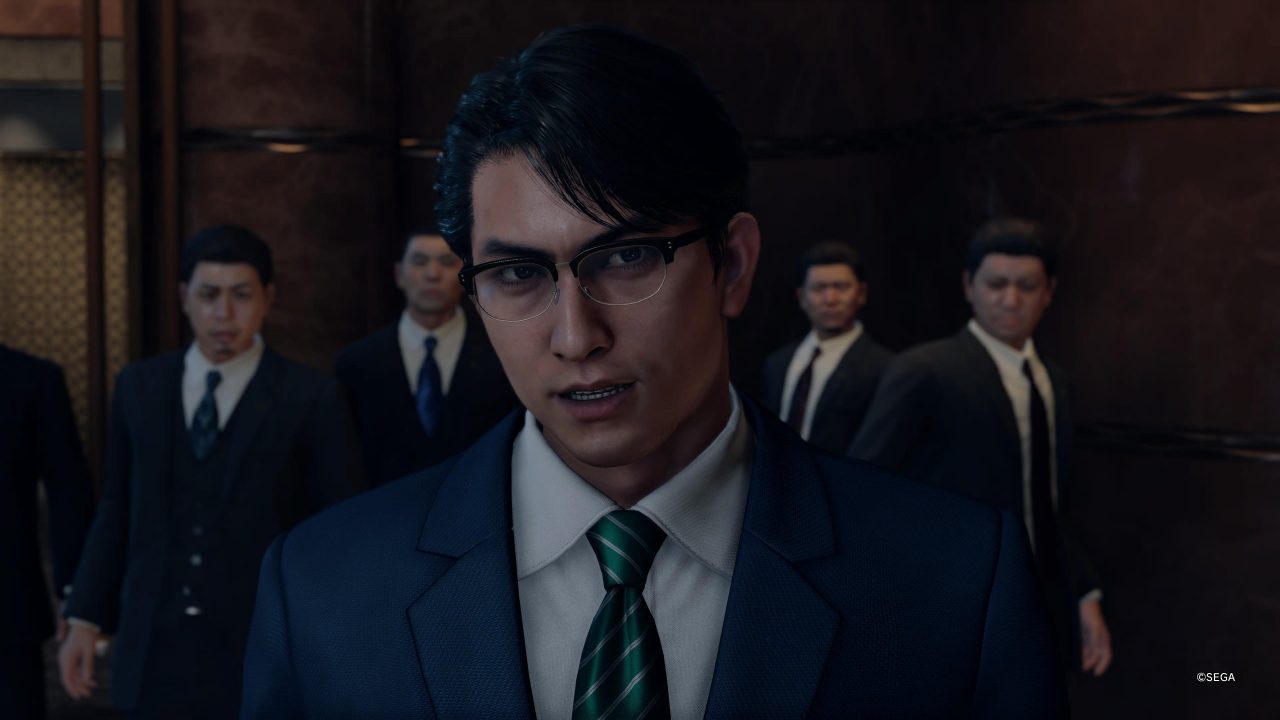
By this point, you probably have a good idea which real-world political figure Aoki most represents, but I’ll say it plainly: none other than Donald Trump. And no, I’m not suggesting that Ryu Ga Gotoku studio intentionally made Aoki resemble Trump. Japan has political corruption too, after all, and the Yakuza games generally focus on issues that relate to Japanese people and foreigners from neighboring countries. Certainly, one shouldn’t automatically ascribe the values or politics of one’s own culture to those of another. But that doesn’t mean that a character or plot can’t also strike a chord with people outside of the country of origin, and sometimes for different reasons than the developers may have intended. The fact is if you look at Aoki from an American perspective, it’s hard not to see the similarities between him and Trump. In fact, Aoki arguably represents what we as a nation could have been in for had Trump been smarter and more cunning about his various power grabs. Which is partly why I find the character so fascinating; looking at Aoki is kind of like looking through a dark mirror. A “what if,” so to speak, and one that feels frighteningly relevant given the timing of LAD’s release.
One of the scariest things about Trump, both during and after his presidency, is the cult of personality he has cultivated. His followers believe his every word, even when those words are mostly lies. They take what he says as permission to propagate conspiracies and justify hatred of some of our country’s most vulnerable communities. His fear-mongering over the validity of the 2020 election, which has been emphatically and repeatedly proven false, has spawned ridiculous legal challenges, baseless recounts, and a landslide of new laws designed to make it harder for people opposed to Trump and the Republican party to vote. It also led to the capitol insurrection attempt on January 6th, 2021, which resulted in multiple deaths and many more injuries.
Aoki operates in a very similar way in LAD. He is naturally charismatic, and his sycophantic co-founder at Bleach Japan is quick to describe him as having brilliant media strategies — giving lots of interviews, appearing on talk shows, and always flashing a great smile at any camera that will look at him. His popularity is so high that his election to the House of Councillors is an overwhelming victory and it’s “basically impossible for him to lose” his bid for the Tokyo governor’s seat. But as we learn in the second half of the game, his underworld connections are key to his rise to power. Not only do they allow him to grow Bleach Japan to the point where it takes off on a national level, but they provide him with leverage over his opponents that cements all of his major political victories. In other words, his whole persona as the leader of a group dedicated to eliminating the corruption of gray zones is a lie because he is himself corrupt and profiting off his very own gray zone. But his followers at Bleach Japan are so enamored with his image that they engage in increasingly problematic behavior, and even when his lies are exposed, they continue to work toward the realization of his vision in more radical, violent, and even deadly ways.
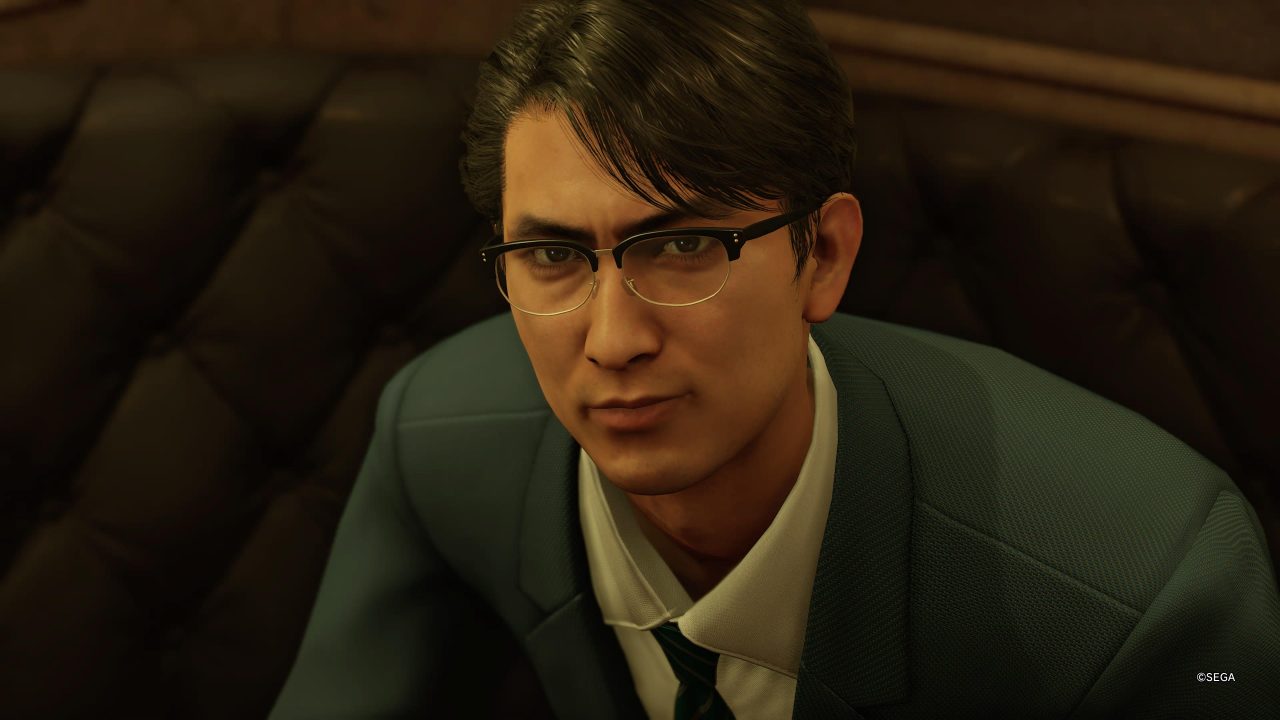
Trump’s intention to help or hinder other politicians in their bids for local or national office also make him dangerous. Trump sees himself as not only a king but also a kingmaker; he wants to show the nation, and the world, that his influence is so high that it’s essentially his way or the highway if you are a Republican vying for political office. Only candidates who play by Trump’s rules or benefit him — in other words, who buy into and support his brand of politics — get his seal of approval, and he wants people to believe that his approval is required to get anywhere in the party. On the one hand, Trump’s track record for delivering victories to his fellow Republicans is less than stellar. Most notably, the Georgia runoffs for U.S. Senate this past January were a huge upset for Republicans, and many blamed Trump for the loss.
On the other hand, the Republican party has proven that it is willing to police its members if they don’t get on board with Trump as the leader of their party. Perhaps the most notable example of this is the repeated censure Representative Liz Cheney — Trump’s most outspoken Republican critic — has faced from members of her own party, both in Washington D.C. and in her home state of Wyoming, for her vote to impeach him after the January 6th insurrection. In fact, Cheney’s betrayal of the party’s “great leader” has been deemed so reprehensible that the Wyoming GOP voted to no longer recognize her as a Republican. That’s right — Trump has effectively tied himself to the GOP in such a way that supporting him has become a litmus test to separate the true Republicans from the pretenders.
In Yakuza: Like a Dragon, Ryo Aoki’s whole power scheme is dependent on his ability to guarantee seats in a snap election based simply on his popularity. To that end, he puts forward a candidate in Kanagawa prefecture’s second district (where the game’s main location Ijincho is located) that by all rights should have no chance of winning. Sota Kume is a fanatical and easily outwitted branch manager of Aoki’s startup Bleach Japan; he is sort of a buffoon and has no political background or experience. If you think that Kume sounds like the last person who should hold political office, that’s by design. Aoki wants to show that even the most undesirable and least likely candidate will win solely with the power of his endorsement. Of course, Aoki rigs the playing field by blackmailing the incumbent behind closed doors, but as far as the public is concerned, Kume wins Kanagawa’s second district simply because Aoki backed him. Aoki also makes good on his promise to the prime minister by winning enough seats in the House of Representatives to keep the latter in power, so he’s essentially a better kingmaker than Trump could ever hope to be.
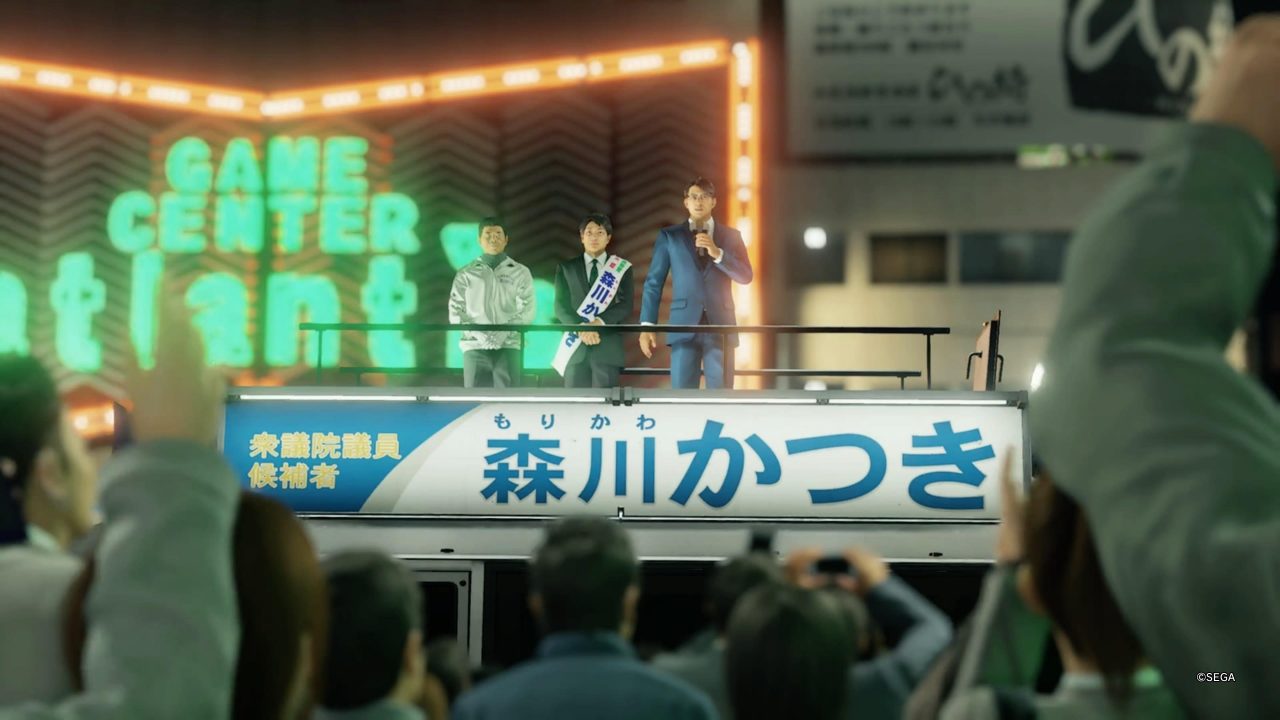
Speaking of the disgraced former president, a significant part of Trump’s 2016 and 2020 election campaigns revolved around his name and real estate empire. Trump predicated his fitness and future performance as president on the “success” of his businesses and his status as a billionaire; only those businesses haven’t exactly been as successful or above board as Trump would like everyone to think. From multiple properties filing for bankruptcy to ventures like Trump University that were essentially scams and have been successfully sued as such, the Trump name is hardly synonymous with accomplishment and honesty. Even Trump’s stated net worth has been called into question, and both he and his businesses have been involved in a multitude of lawsuits over everything from sexual assault to unfair housing practices and antitrust violations. There are even allegations that he was involved with the mafia, and while this might not seem so surprising for a real estate mogul in the last fifty years, it’s relevant because it ties back into Ryo Aoki.
As I mentioned at the start of this piece, Aoki is largely able to achieve his political ambitions thanks to his criminal connections, what he calls his “rear-facing power.” The yakuza family he’s tied to finds dirt on his political opponents that he uses to ensure his electoral victories. And once in position as governor of Tokyo, he continues to use yakuza muscle as foot soldiers to get what he wants and eliminate anyone in his way.
Now, I’m not saying that Trump has dipped quite this far into illegal behavior before, during, or since his stint as president. Of course, no one has suggested that Trump had anyone killed on his behalf, and it’s never been proven that he has ties to the criminal underworld. But it is certainly the case that Trump or his various businesses and business associates have engaged in dubious activities of an alleged or even proven illegal nature. And it is absolutely the case that Trump benefitted from his business and family connections, regardless of how legal or illegal they may have been, when campaigning for and during his presidency. At the very least, the seemingly never-ending list of indictments of known Trump associates and Trump’s own dogged attempts to hide his business and personal dealings from prying eyes, even those of Congress, don’t inspire confidence that he is an honest and law-abiding businessman, as he would have everyone believe.
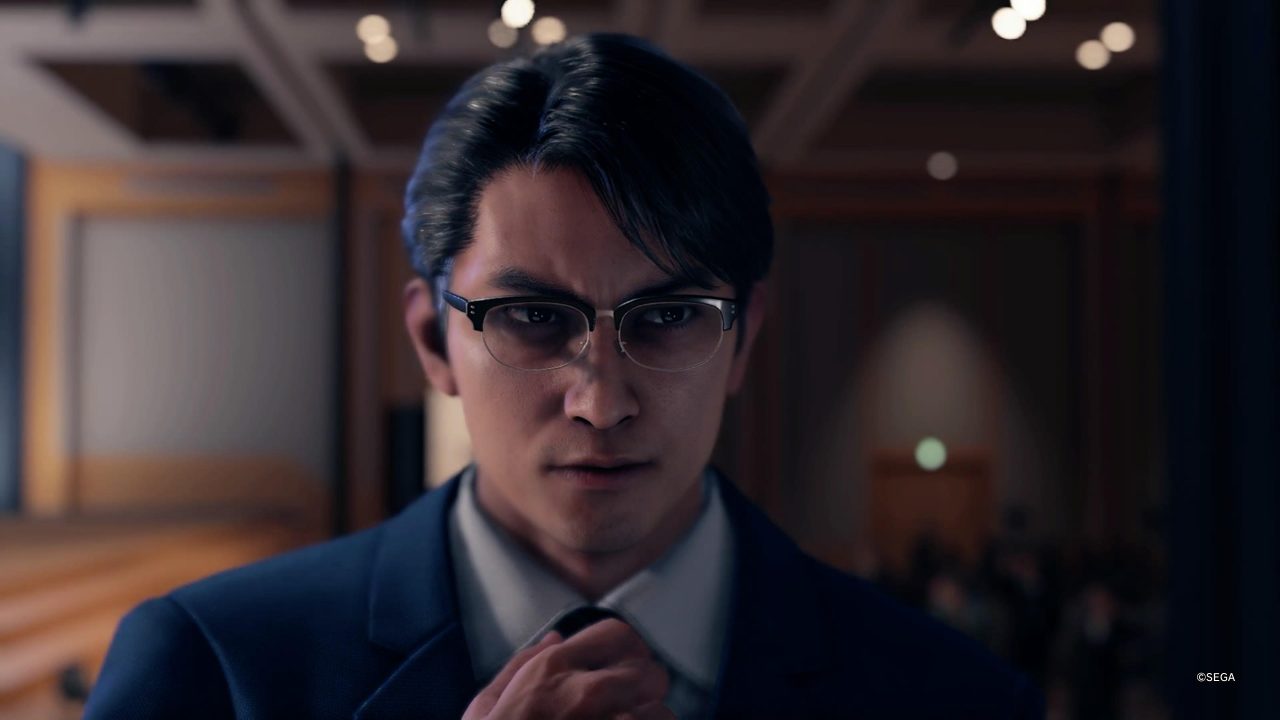
One final point of comparison that I want to make between these two autocrats is their general reaction to criticism. Aoki repeatedly demonstrates in LAD that he doesn’t tolerate dissent, even among his allies or former associates. When his second-in-command, Jo Sawashiro, expresses doubt, Aoki is quick to respond with vitriol and threats. And when Ichiban and company realize Aoki’s involvement in their misadventures and attempt to convince him to stop, Aoki tries to have them killed — several times. As I said before, there is nothing to suggest that Trump has gone quite this far to silence his critics, but he’s certainly not afraid to lambast them in public either, or else leave them for his sycophantic allies — in the Republican party as described above, or in the general populace, as demonstrated by the number of people willing to dismiss unfavorable reporting as “fake news” after Trump popularized the phrase.
A more exhaustive comparison is beyond the scope of this feature, and really, my point is not that Aoki and Trump are identical. Because they’re not. Aoki is arguably worse and more dangerous than Trump because he is ultimately more successful not only in his rise to power but also in fooling an entire nation about his origins and intentions. For all of Trump’s bluster about being a successful businessman and one of our best leaders, he is absolutely horrible at hiding the reality of his crumbling real estate empire and convincing half the country that his actions as president were fair and just. Sure, his supporters believe the image he tries to sell, but that’s nothing compared to how LAD presents Aoki. Just about everyone in the country buys the image Aoki has crafted, and without Ichiban and his friends interfering, it is highly probable that Aoki would have secured the “front-facing power” he sought without anyone outside of his inner circle knowing about his true nature.
Some of this difference stems from the fact that Aoki is a video game villain, of course — he can achieve things and be more dastardly than would perhaps be possible for a real-life politician. But just imagine if Trump had been much more capable — if he had been a better liar, if he had covered his company’s and family’s corruption better, if he had been more successful at charming more of the country into believing him, and so on. If I may be blunt, Trump is a bumbling idiot, and he still managed to lead our country into a dark time of unprecedented divisiveness, bigotry, fascist nationalism, and naked corruption — all of which threaten the very democratic values our nation was founded on. If he had been more capable like Aoki … honestly, I don’t even want to think about it.
Thankfully, Aoki is not Trump, and Trump is not Aoki. Trump would have made for a poor villain, and Aoki would have been a far worse nightmare than the one Americans have lived through for the last five years. So obviously, it is doubly for the best that their roles were not reversed. Still, it is morbidly interesting to consider them as dark reflections of each other, even if the developer did not intend this. Art reflects reality, as they say, and though the reflection may be different depending on who views it, there is much we can learn about ourselves and the hard truths of the world around us if we only peek through the looking glass with open eyes and minds.

